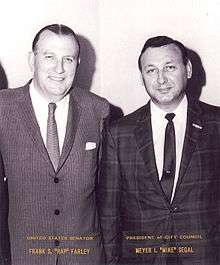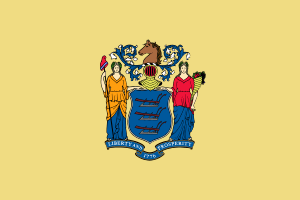Frank S. Farley
| Frank S. Farley | |
|---|---|
 Senator Frank S. "Hap" Farley with President of Ventnor City Council, Meyer I. "Mike" Segal | |
| President of the New Jersey Senate | |
|
In office 1945 | |
| Preceded by | George H. Stanger |
| Succeeded by | Haydn Proctor |
|
In office 1962 | |
| Preceded by | Robert C. Crane |
| Succeeded by | William E. Ozzard |
| Member of the New Jersey Senate | |
|
In office 1941 – January 11, 1972 | |
| Preceded by | Thomas D. Taggart, Jr. |
| Succeeded by | Joseph McGahn |
| Constituency |
Atlantic County (1941–66) 1st district (1966–68) 2nd district (1968–72) |
| Member of the New Jersey General Assembly from the Atlantic County district | |
|
In office 1938–1941 | |
| Personal details | |
| Born |
December 1, 1901 Atlantic City, New Jersey, U.S. |
| Died |
September 24, 1977 (aged 75) Ventnor City, New Jersey, U.S. |
| Political party | Republican |
| Spouse(s) | Marie Fey |
| Alma mater | Georgetown University |
| Profession | Lawyer |
Francis Sherman "Hap" Farley (December 1, 1901 – September 24, 1977) was a New Jersey State Senator from Atlantic County, New Jersey, who exercised considerable power on the local and state levels for several decades. He served for what was then a record 34 years in the New Jersey Legislature and between the early 1940s and the early 1970s was the "boss" of the Republican political machine that controlled the Atlantic City, New Jersey, and Atlantic County governments.
Biography
Farley was born December 1, 1901, in Atlantic City, the youngest of ten children born to James and Maria (Clowney) Farley.[1] As a youth, teammates gave him the nickname "Happy", which was shortened to "Hap" as he got older.[1] He attended Wenonah Military Academy and the University of Pennsylvania, before graduating from Georgetown Law School in 1925.[2]
In the legislature
In 1937, Farley was elected to represent Atlantic County in the New Jersey Assembly, and in 1940 he was elected to the New Jersey Senate. In 1941, Enoch "Nucky" Johnson, boss of the Atlantic City/Atlantic County Republican political machine, was convicted of income tax evasion and sent to prison. Farley, after a struggle with rival Thomas D. Taggart, Jr., mayor of Atlantic City, succeeded Johnson as the leader of the organization.[1][3]
Farley rose through the leadership ranks of the State Senate to become Senate majority leader in January, 1944.[4] By early 1945 he was Senate President.[5] As state senator, Farley was president of the "21 Club", which was composed of New Jersey's county Republican chairmen, and which provided a basis for Farley to exert statewide political influence.[2][6]
Among the projects that Farley actively promoted and was instrumental in accomplishing were Atlantic City Race Course, the Garden State Parkway (which was referred to by North Jersey legislators as "Farley's Folly"), the Atlantic City Expressway (the service plaza, Farley Service Plaza, of which is now named in his honor), the Atlantic City Marina (now Senator Frank S. Farley State Marina), Stockton State College, and the construction of county community colleges.[2][6] Farley believed that his political success lay primarily in persuading other legislators “not to hurt us if you can’t help us”, and in treating other legislators the same way.[6]
When Farley entered the New Jersey Senate, each of the state’s twenty-one counties was represented by one senator. This resulted in the smaller counties, which included most South Jersey counties, having a disproportionate amount of power, and Farley was very effective in assembling a majority of the twenty-one senators to support his proposals. Farley’s legislative power was ultimately diluted as a result of the United States Supreme Court’s 1962 decision in Baker v. Carr, which required that representation in state legislatures be based on population, not counties. As a result, the size of the state senate grew to forty members, with most of the new seats representing districts in North Jersey, and it was much more difficult for Farley to control the legislative process.[1]
Farley served as a delegate to the Republican National Convention starting in 1944, and was instrumental in getting the New Jersey delegation at the 1968 Republican National Convention to switch their support from favorite son Clifford P. Case to Richard Nixon.[2]
In the latter part of Farley’s legislative career, a growing number of Atlantic City activists and leaders proposed the legalization of casino gambling as a way to rebuild the deteriorated city and rejuvenate its declining economy. Until near the end of his senatorial career, Farley refused to back casino gambling, a position that some close to him attributed to a desire to avoid the increased scrutiny that gambling would bring to bear on his political machine.[1] During his final year as state senator, however, Farley did attempt to enact legislation to authorize a referendum that would legalize gambling in Atlantic City. The proposed legislation, which was officially sponsored by Farley's political ally Senator Frank X. McDermott (R-Union) because Farley feared a backlash if he publicly appeared to support it, lacked safeguards and was soundly defeated in the Senate.[7]
After leaving the legislature
In 1971, Farley was defeated in his attempt for reelection by Dr. Joseph McGahn, the Democratic candidate.[8]
In the early 1970s, after Farley left office, the Federal Aviation Administration planned to close the National Aviation Facilities Experimental Center (now known as the William J. Hughes Technical Center) located in the Pomona section of Galloway Township, which was one of the largest employers in Atlantic County. Farley, at the request of community leaders, went to administration officials in Washington, who intervened, and the facility was not closed.[9]
In 1974, supporters of legalized casino gambling in Atlantic City succeeded in having a referendum placed on the New Jersey general election ballot that would have permitted casino gambling throughout the state. After the proposal was soundly defeated by voters, some criticized the failure of proponents of the measure to involve Farley in the effort,[10] and Farley also expressed disappointment in not having been involved.[9]
After their defeat in 1974, supporters of gambling regrouped under the direction of Meyer I. (Mike) Segal, who served as Chairman of the Committee to Legalize Gaming, and were successful in placing another referendum on the November 1976 ballot that would permit casino gambling in only Atlantic City. This time, casino proponents were much better organized than they had been in 1974, and Segal sought the assistance of Farley, who worked extensively behind the scenes.[1][11] Farley successfully urged old political allies in other parts of the state to support the measure, including Bergen County Sheriff Joseph Job, and some observers estimated that these efforts resulted in hundreds of thousands of votes in favor of casinos.[12] This time the referendum was approved by a wide margin. Sanford Weiner, the campaign strategist hired by the pro-casino organization, the Committee to Rebuild Atlantic City, considered obtaining Joseph Job's support for the measure to be the decisive factor in securing the victory.[7]
Farley married Marie Feyl.[9] He died on September 24, 1977, at his home in Ventnor City, New Jersey.[2] The New York Times described Farley as "probably the most powerful legislator in New Jersey history"[6] further noting that he was "an artful negotiator whose backroom wheeling and dealing were legendary", and that he "was credited with pushing through more special legislation for his district, Atlantic City and Atlantic County, than any other legislator".[2]
Further reading
- Johnson, Nelson. Boardwalk Empire, Medford, N.J., Plexus Publishing, 2002 ISBN 0-937548-49-9. Undoubtedly the best single source of information about Hap Farley.
References
- 1 2 3 4 5 6 Johnson, Nelson. Boardwalk Empire, Medford, N.J., Plexus Publishing, 2002 ISBN 0-937548-49-9
- 1 2 3 4 5 6 Kleiman, Dena. "Frank S. Farley, 75, Ex-Legislator And G.O.P. Leader in Jersey, Dies", The New York Times, September 25, 1977. Accessed July 25, 2012. "Frank S. Farley, a former New Jersey State Senator who served 34 years in the Legislature longer than anyone in New Jersey history and was regarded as one of the state's most influential politicians, died yesterday at his home in Ventnor, N.J. He was 75 years old."
- ↑ "TWO HELD SEEKING JOHNSON'S MANTLE; Senator Farley Claims It -- Mayor Taggart Not Talking", The New York Times, July 28, 1941. Accessed August 18, 2008.
- ↑ "Jersey Demands Income Tax Curb", The New York Times, January 12, 1944, p. 25
- ↑ "EDUCATION BILLS PASS JERSEY SENATE", The New York Times, March 24, 1944, p. 15
- 1 2 3 4 Staff. "In Honor of Fighting Frank Farley", The New York Times, April 11, 1977. Accessed July 25, 2012.
- 1 2 Sternlieb, George and Hughes, James W. The Atlantic City Gamble, Cambridge, Mass., Harvard University Press, 1983
- ↑ Carroll, Maurice. "DEMOCRATIC GAINS POSTED IN JERSEY; G.O.P. Control of Assembly Imperiled and Senate Edge Is Cut -- Farley Beaten Jersey Democrats Score Gains in the Legislature", The New York Times, November 3, 1971. Accessed August 18, 2008.
- 1 2 3 Sardella, Carlo M. "At 74, Farley Reminisces on Politics", The New York Times, December 7, 1975. Accessed July 25, 2012.
- ↑ Staff. "Outlook Is Bleak For Atlantic City; Gambling Setback Casts a Pall Over Atlantic City Mayors Unit to Meet", The New York Times, November 10, 1974, p. 89. Accessed July 25, 2012.
- ↑ Sardella, Carlo M. "Atlantic City Bets on Casinos", The New York Times, July 18, 1976, p. 268. Accessed July 25, 2012.
- ↑ Simon, Bryant. Boardwalk of Dreams, New York, Oxford University Press 2004, ISBN 0-19-516753-8, p. 178
| Political offices | ||
|---|---|---|
| Preceded by George H. Stanger |
President of the New Jersey Senate 1945 |
Succeeded by Haydn Proctor |
| Preceded by Robert C. Crane |
President of the New Jersey Senate 1962 |
Succeeded by William E. Ozzard |
